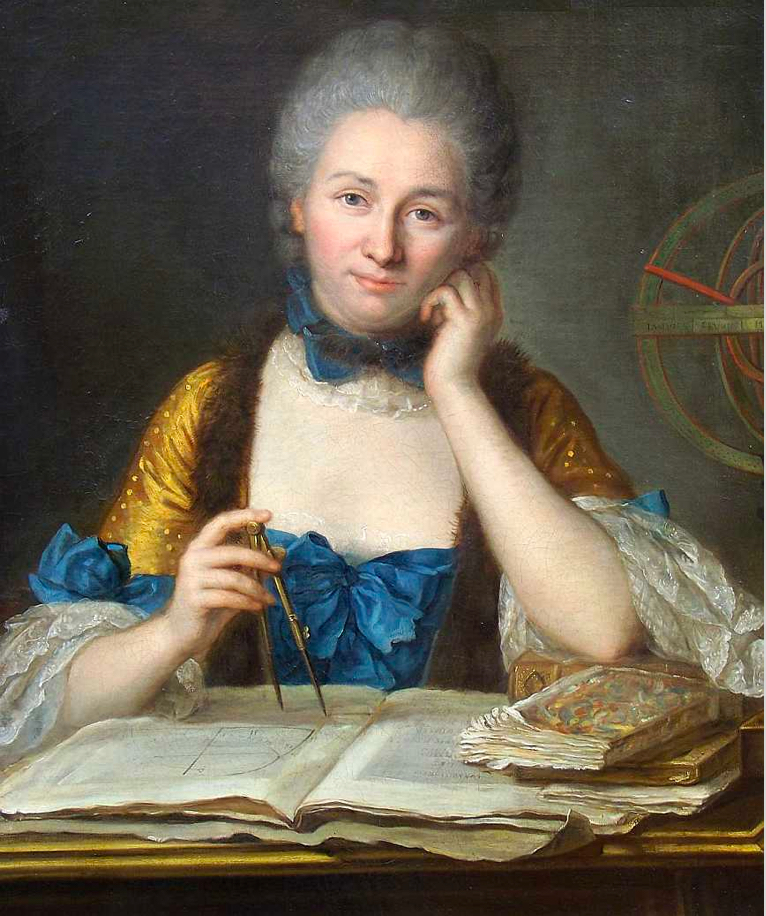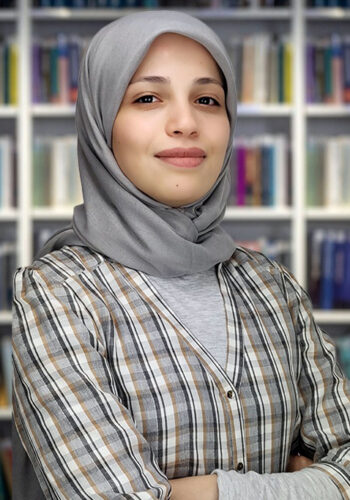Pourquoi la tech ?
Je suis intriguée par la façon dont la technologie transforme continuellement nos vies et stimule l’innovation. La tech offre des possibilités infinies de résoudre des problèmes complexes et d’avoir un impact significatif sur la société et les industries.
Votre parcours ?
J’ai commencé par étudier les mathématiques appliquées, puis je me suis orientée vers l’ingénierie. La précision avec laquelle on peut prédire les phénomènes météorologiques m’a fascinée et m’a incitée à me spécialiser en météorologie pour explorer les principes mathématiques qui régissent ces prévisions. Par la suite, je me suis plongée dans le domaine de l’informatique, big data, et de l’intelligence artificielle, en me spécialisant finalement dans leur application pour comprendre, prédire et gérer les risques environnementaux.
Votre première expérience professionnelle dans la tech ?
Ma première expérience professionnelle dans la tech était au service météorologique marocain, où je me suis spécialisée dans l’intégration des observations des stations automatiques dans le modèle de prévision ALADIN. Cela impliquait l’utilisation de techniques d’assimilation de données variationnelles en 3D pour comprendre comment ces observations pouvaient améliorer la précision des prévisions.
Que faites-vous aujourd’hui et pourquoi ?
Aujourd’hui, en tant que scientifique, je me consacre à l’analyse des risques environnementaux en identifiant leurs déterminants et en explorant les moyens de les atténuer grâce à l’intelligence artificielle. Cette démarche s’inscrit dans la continuité de mon intérêt profond pour les sciences de l’environnement et tire parti de mon expertise en intelligence artificielle, me permettant ainsi de contribuer à des solutions durables face aux enjeux globaux pressants.
Vos atouts pour ce poste ?
Dans ce poste, mon expérience en big data et en intelligence artificielle, particulièrement pour des applications géophysiques, complète ma capacité à gérer d’importants ensembles de données et à appliquer des analyses statistiques complexes. Je possède de solides compétences en programmation Python et en script Shell UNIX, qui me permettent de travailler efficacement sur des plateformes informatiques haute performance. Ma capacité à développer des solutions innovantes et à m’adapter rapidement aux nouveaux défis est essentielle pour ma fonction.
Vos défis passés, vos ratés, vos grands moments de solitude ?
Au cours de ma carrière, j’ai été confrontée à plusieurs défis et revers qui ont été essentiels à ma croissance professionnelle. Au début de ma carrière, j’ai participé à un projet de ville intelligente conçu pour atténuer les coupures de courant à travers un système d’alimentation électrique ‘intelligent’. Nous visions à établir une infrastructure robuste de cloud et de big data, intégrant des technologies telles que Kafka, Spark, Hadoop, Kibana et ElasticSearch. Malgré notre expertise collective, le projet a rencontré des défis significatifs. Notre équipe avait des opinions diverses sur la configuration, ce qui a entraîné des retards car différentes configurations étaient proposées mais pas entièrement mises en œuvre. De plus, nous avons été confrontés à des problèmes d’intégrité des données, certaines s’avérant corrompues, ce qui a encore compliqué nos efforts. Cette expérience m’a enseigné l’importance d’une direction d’équipe unifiée, d’une validation rigoureuse des données et de la nécessité d’une gestion de projet flexible mais décisive. Surmonter ces obstacles a été crucial et m’a fourni des perspectives approfondies sur la gestion des intégrations technologiques complexes et la dynamique d’équipe.
Vos meilleurs moments, les succès dont vous êtes fière ?
L’une des réalisations dont je suis le plus fière est d’avoir réussi à soumettre un projet un mois à l’avance dans des circonstances difficiles. Initialement, en raison de problèmes de communication au sein du consortium du projet, il était crucial d’accélérer le processus. En hiérarchisant mes tâches et en coordonnant stratégiquement les efforts des différentes équipes, j’ai réussi à mener le projet à bien en avance sur le calendrier prévu. Un autre moment marquant pour moi est le développement et la mise en œuvre d’un système de recommandation agricole. Ce système, qui exploite l’intelligence artificielle, fournit aux agriculteurs des conseils basés sur des données pour la gestion des cultures, la santé des sols et l’allocation des ressources. Voir cet outil évoluer d’un simple concept à une application concrète avec un impact réel sur la productivité agricole a été extrêmement gratifiant.
Des personnes qui vous ont aidée/marquée ou au contraire rendu la vie difficile ?
Tout au long de ma carrière, j’ai eu la chance de travailler avec de nombreux collègues inspirants qui ont façonné mon parcours professionnel. En particulier, j’ai eu un superviseur qui m’a initié aux méthodes avancées de quantification de l’incertitude. Au-delà de son impressionnant parcours professionnel, il est toujours prêt à prêter main-forte et déterminé à apporter une différence positive dans la vie des personnes autour de lui.
J’ai fait aussi face à des situations complexes au sein de certains groupes de travail, ce qui a aiguisé ma capacité à évaluer les environnements et à prendre des décisions stratégiques, m’assurant que je suis là où je peux avoir le plus d’impact et continuer à évoluer professionnellement.
Vos envies et défis à venir ?
À l’avenir, je suis impatiente d’approfondir mon engagement dans des projets qui intègrent l’intelligence artificielle à la science environnementale. Mon objectif est de stimuler des innovations qui améliorent non seulement la précision des modèles environnementaux mais facilitent également des réponses plus efficaces face aux défis climatiques. Un défi majeur sera de garantir que ces technologies soient accessibles dans les régions les plus vulnérables au changement climatique. Cet effort nécessitera des avancées technologiques ainsi qu’une collaboration étendue à travers différentes disciplines et cultures, des défis que je suis enthousiaste à relever.
Et que faites-vous en dehors de votre travail ?
Lorsque je ne travaille pas, je consacre du temps à faire du bénévolat dans le cadre de programmes qui enseignent le codage aux enfants défavorisés. Il est incroyablement gratifiant de partager mes connaissances en matière de technologie et de voir qu’elles suscitent la curiosité et la confiance chez les jeunes. En outre, je poursuis ma passion pour la photographie, en capturant la nature à travers « mes yeux ».
Vos héroïnes (héros) de fiction, ou dans l’histoire ?
Alan Turing et Al-Khwarizmi sont des personnages historiques qui m’inspirent profondément en raison de leurs contributions révolutionnaires à l’informatique et aux algorithmes. Al-Khwarizmi, souvent appelé le « père de l’algèbre », a ouvert la voie à la résolution algorithmique de problèmes au IXe siècle, en élaborant des méthodes qui sont à la base de l’informatique moderne. D’autre part, Alan Turing, mathématicien du XXe siècle, a développé le concept de la machine de Turing, qui a joué un rôle fondamental dans le façonnement du monde numérique d’aujourd’hui. Leur esprit d’innovation et leur impact durable sur la technologie font d’eux de véritables héros à mes yeux.
Votre devise favorite ?
« Faites de votre vie un rêve, et d’un rêve, une réalité. » – Antoine de Saint-Exupéry. Cette citation nous encourage à aspirer au-delà de l’ordinaire, à rêver grand, puis à prendre les mesures nécessaires pour transformer ces rêves en expériences vécues. Elle évoque le pouvoir de la vision et de l’action dans la construction de nos vies.
Un livre à emporter sur une île déserte ?
« Méditations » de Marc Aurèle. Ce livre, composé des pensées et réflexions privées de l’empereur romain, explore en profondeur la philosophie stoïcienne et offre des conseils sur comment affronter l’adversité avec résilience et maintenir la paix intérieure malgré les circonstances extérieures.
Un message ou un conseil aux jeunes femmes ?
Ne laissez pas les autres ou les préjugés sociétaux vous décourager de poursuivre vos passions. Entourez-vous de personnes qui vous soutiennent et vous valorisent, et qui vous encourageront. Continuez à vous surpasser pour être la meilleure version de vous-même et soyez confiantes quant à la prise de risques et à l’essai de nouvelles choses.


